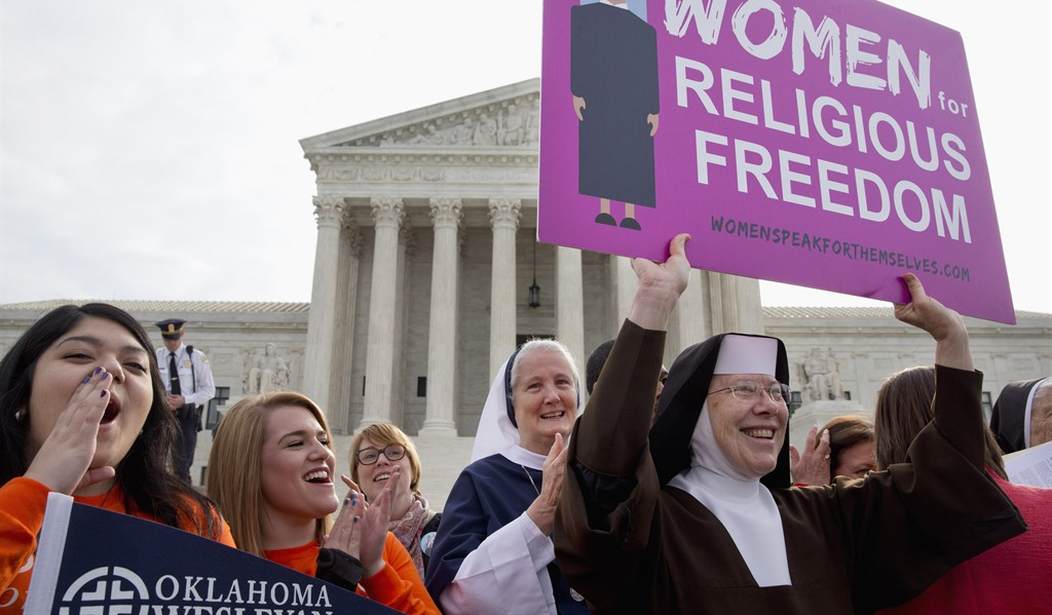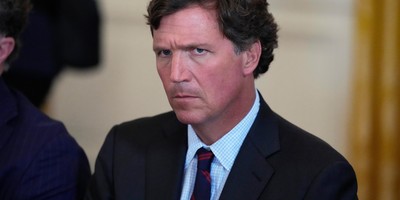Many reporters attending oral arguments in the Supreme Court sit in assigned chairs on the far left side of the chamber.
These chairs stand behind a double row of massive marble columns. Brass gates, some opened and some closed, stretch between the columns; burgundy curtains, pulled back by cords, hang behind them.
Given their assigned seats, some reporters may not be able to see any of the justices holding forth at the front of the chamber.
All they hear are their voices.
Because the court only releases a transcript and audio recording of its arguments, the only Americans who definitely can see the faces of these justices as they bicker about the law -- and our God-given rights -- are those in the very small group granted entry into the central space of the chamber.
So it was last week, when the voice of Justice Ruth Bader Ginsburg spoke up early in the oral arguments in Zubik v. Burwell.
This case carries the last names of the Catholic bishop of Pittsburgh (David A. Zubik) and President Barack Obama's secretary of Health and Human Services (Sylvia Burwell).
From the secular sanctuary beyond the columns and curtains, Ginsburg seemed to make a telling concession.
"No one doubts for a moment the sincerity of the belief of your client and all the others," she said to lawyer Paul Clement, who was representing, among others, the Little Sisters of the Poor.
"And since sincerity of their belief is accepted, it's off the table," said Ginsburg.
One of the beliefs Catholic organizations presented in Zubik was summarized in a brief presented by, among others, the Diocese of Pittsburgh: "Petitioners believe that in order to stay true to their Catholic faith, they may hire an insurance company only if it will not provide their students and employees with coverage that may destroy human life or artificially prevent its creation."
Recommended
The Obamacare regulation at issue in Zubik mandates that Catholic organizations do this -- or give up all health insurance for their employees and be fined.
The court, Justice Ginsburg seemed to signal, was not going to argue with the Catholic Church about what is and is not consistent with the Catholic faith.
But the voice of Justice Sonia Sotomayor presented another question: How can the government function if it cannot demand people do things they believe will damn their souls?
"Because every believer that's ever come before us, including the people in the military, are saying that my soul will be damned in some way," said Sotomayor.
"I'm not naysaying that that is a very substantial perceived personal burden by them," she said. "But if that's always going to be substantial, how will we ever have a government that functions? How will we ever have anything that the government can demand people to do in objecting ... that won't be a problem?"
The First Amendment itself answers Sotomayor's question: "Congress shall make no law respecting an establishment of religion, or prohibiting the free exercise thereof."
When federal regulators force Catholics to buy or provide health insurance plans that cover sterilizations, contraceptives and abortion-inducing drugs and devices they are denying Catholics the "free exercise" of religion guaranteed in the Bill of Rights.
But, according to the Supreme Court's official transcript, not one voice in the court during the oral arguments in Zubik used the term "free exercise" of religion.
That is because the court will not decide this case using the language and meaning of the First Amendment. It will decide using the Religious Freedom Restoration Act of 1993.
"Government," says that act, "may substantially burden a person's exercise of religion only if it demonstrates that application of the burden to the person (1) is in furtherance of a compelling governmental interest; and (2) is the least restrictive means of furthering that compelling governmental interest."
In the Hobby Lobby case two years ago, a 5-4 majority (including Chief Justice John Roberts and Justices Sam Alito, Clarence Thomas, Anthony Kennedy and Antonin Scalia) ruled that the Obamacare regulation was a substantial burden on the religious exercise of Hobby Lobby's owners, who did not want to cover abortifacients. But that majority also "assumed" the government was furthering a compelling interest with the regulation.
Where the government failed in Hobby Lobby was in convincing five justices that it was furthering its compelling interest by the least restrictive means.
To win the power to require Catholic organizations to act against the Catholic faith -- and, thus, surrender the free exercise of religion -- all the government needs is one more justice than it had in Hobby Lobby.
What America needs are more voices on the court that will defend not only the free exercise of religion but every word in the Constitution.
























Join the conversation as a VIP Member